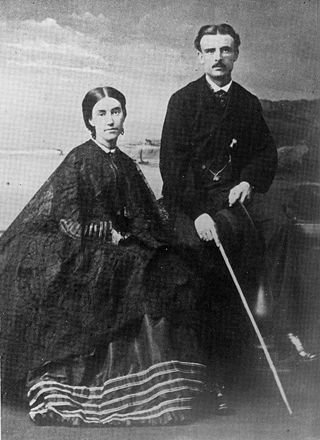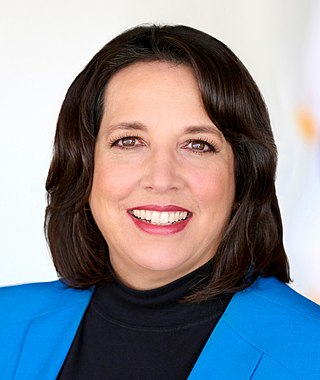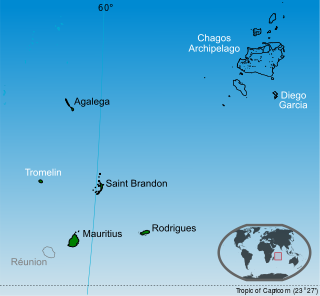
Mauritius, officially the Republic of Mauritius, is an island country in the Indian Ocean, about 2,000 kilometres off the southeastern coast of East Africa, east of Madagascar. It includes the main island, as well as Rodrigues, Agaléga, and St. Brandon. The islands of Mauritius and Rodrigues, along with nearby Réunion, are part of the Mascarene Islands. The main island of Mauritius, where population is concentrated, hosts the capital and largest city, Port Louis. The country spans 2,040 square kilometres (790 sq mi) and has an exclusive economic zone covering 2,300,000 square kilometres.
The known history of Mauritius begins with its discovery by Arabs and Malays, followed by Europeans and its appearance on maps in the early 16th century. Mauritius was successively colonized by the Netherlands, France and Great Britain, and became independent on 12 March 1968.

British Guiana was a British colony, part of the mainland British West Indies, which resides on the northern coast of South America. Since 1966 it has been known as the independent nation of Guyana.

Sir Frederick Napier Broome was a colonial administrator in the British Empire, serving in Natal, Mauritius, Western Australia, Barbados and Trinidad and Tobago. The Western Australian towns of Broome and Broomehill are named after him. He has signed his name as F. Napier Broome.

Sir John Pope Hennessy, was an Irish and British politician and colonial administrator who served as the eighth Governor of Hong Kong and the fifteenth Governor of Mauritius.

The lieutenant governor of Massachusetts is the first in the line to discharge the powers and duties of the office of governor following the incapacitation of the Governor of Massachusetts. The constitutional honorific title for the office is His, or Her, Honor.

Elections in Southern Rhodesia were used from 1899 to 1923 to elect part of the Legislative Council and from 1924 to elect the whole of the Legislative Assembly which governed the colony. Since the granting of self-government in 1923, Southern Rhodesia used the Westminster parliamentary system as its basis of government. The Political party that had most of the seats in the Legislative Assembly became the government. The person in charge of this bloc was the Premier, later renamed Prime Minister, who then chose his cabinet from his elected colleagues.
Legislative Council elections were held in Southern Rhodesia on 17 April 1899. They were the first elections to take place in the colony and followed the Southern Rhodesia Order in Council of 1898 which granted the colony a Legislative Council consisting of at least ten voting members: the Administrator of Southern Rhodesia ex officio, five members nominated by the British South Africa Company, and four members elected by registered voters. The Resident Commissioner of Southern Rhodesia, Sir Marshal James Clarke, also sat on the Legislative Council ex officio but without the right to vote.

The House of Assembly of the British Virgin Islands, until 2007 known as the Legislative Council, has 15 members: 13 directly elected for four-year terms, and two ex officio members.

The Constitution of the State of Oklahoma is the governing document of the U.S. State of Oklahoma. Adopted in 1907, Oklahoma ratified the United States Constitution on November 16, 1907, as the 46th U.S. state. At its ratification, the Oklahoma Constitution was the lengthiest governing document of any government in the U.S. All U.S. state constitutions are subject to federal judicial review; any provision can be nullified if it conflicts with the U.S. Constitution.

General elections were held in Mauritius on 9 March 1959. The result was a victory for the Labour Party, which won 24 of the 40 seats. They were the first elections in Mauritius to be held with universal suffrage.

Mauritius was a Crown colony off the southeast coast of Africa. Formerly part of the French colonial empire, British rule in Mauritius was established de facto with the Invasion of Isle de France in November 1810, and de jure by the subsequent Treaty of Paris. British rule ended on 12 March 1968, when Mauritius became independent.

South Carolina government and politics covers the three different branches of government, as well as the state constitution, law enforcement agencies, federal representation, state finances, and state taxes. South Carolina is a state in the United States of America and was the eighth admitted to the Union. The state of South Carolina was preceded by the Crown Colony of South Carolina, a constitutional monarchy which was overthrown during the American Revolution. Presently, South Carolina's government is formed as a representative democracy.

Sovereignty over the Chagos Archipelago is disputed between Mauritius and the United Kingdom. Mauritius has repeatedly stated that the Chagos Archipelago is part of its territory and that the United Kingdom claim is a violation of United Nations resolutions banning the dismemberment of colonial territories before independence. On 22 May 2019, the United Nations General Assembly adopted a non-binding resolution declaring that the archipelago was part of Mauritius, with 116 countries voted in favor of Mauritius while six opposed it.
Guy Rozemont (1915–1956) was a Mauritian trade unionist and the third leader of the Mauritius Labour Party. He fought for workers' rights and voiced against the injustice done against them. He played a crucial role in shaping the government, political culture and foreign policy of modern Mauritius.

The Legislative Council was the legislature of Nyasaland.
Maurice Curé (1886-1977) was one of the founders of the Labour Party in Mauritius in 1936.
Gnanadicarayen Arlanda, more commonly known as Louis Arlanda or Gnanadicarayen Louis Arlanda was a Mauritian politician and businessman. He was the first Indo-Mauritian to become a member of the ruling Council, which was an early form of modern-day National Assembly or Parliament of Mauritius.
Sir Virgile Naz (1825-1901) was a Mauritian lawyer, businessman and politician who was elected in British Mauritius to the Council of the Government of Mauritius, the predecessor of modern-day National Assembly or Parliament.
Sir William Newton (1842-1915) was a Mauritian lawyer and politician who was elected in British Mauritius to the Council of the Government of Mauritius, the predecessor of modern-day National Assembly or Parliament.